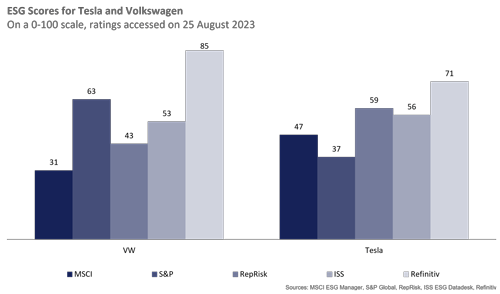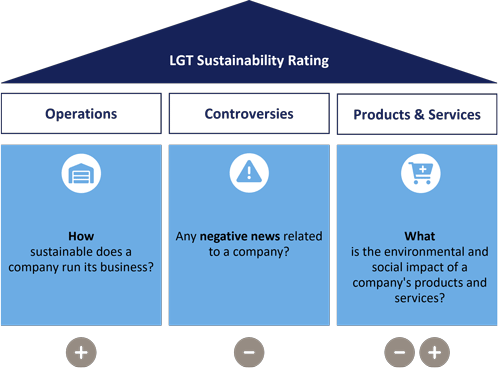ESG ratings are heavily criticized, but LGT has found a way to use them to produce comprehensive, reliable sustainability assessments our clients expect. How are we doing it?
As ESG ratings have become more important over the past few years, criticisms have emerged of their shortcomings, as well as calls for greater regulatory oversight.
Critics have questioned the conflicts of interest inherent in the business models of ESG rating agencies, the lack of transparency in rating methodologies, and the inconsistency of the ESG metrics used across providers. Most importantly, detractors have pointed to the lack of correlation in results across different ESG ratings, which poses significant challenges for many clients and has led to questions about the quality of the ratings themselves.
ESG Ratings Are Highly Uncorrelated
A study published in November 2022 in the Review of Finance demonstrated this very clearly: the correlation between ESG rating providers ranged at a low level from 0.38 to 0.71, illustrating the differences. By contrast, credit ratings have correlations closer to 1. The example below demonstrates these differences in the scores of five leading ESG ratings for two well-known automobile manufacturers.
(Click image for large view)
Due to Differences in Focus
Do these differences reflect issues of data quality? We believe not. Rather, diverging results reveal fundamental differences in the methodologies of the ESG rating providers. Broadly speaking, ESG ratings came in two varieties:
- ESG ratings focus on a company’s operations, which assess how sustainability issues impact company performance, with the scores reflecting how effectively the company manages environmental, social and governance risks.
- ESG ratings focused on the company’s products and services, which assess their impacts on the environment and society, favouring companies with sustainable product lines and penalizing companies with products posing environmental or social risks.
Neither approach alone is sufficient, given that any investment decision is ultimately made on the company as a whole. Investors quite rightly expect assessments that capture both aspects of company performance.
Clients Demand a Complete Picture
At LGT, we have worked to develop a more holistic approach to sustainability assessments to meet these investor expectations. Doing so requires an assessment of sustainability that is built on uninterpreted ESG data points and KPIs. Only by focusing on the underlying raw data is it possible to develop an assessment that is free from the bias inherent in the particular viewpoint or interpretation of a specific ESG rating approach.
These underlying ESG metrics also let us make assessments that reflect sector-specific issues, by controlling the weighting as well as the specific KPIs used in the assessments for each sector. In addition, given that the relevance of sustainability issues continues to evolve, using underlying KPIs allows us to update the assessment as new issues and ESG data metrics become available over time.
Combining ESG Data From Several Providers
In addition to basing our assessment on underlying ESG metrics, it is also important to use a combination of ESG data providers to develop a comprehensive perspective. ESG rating agencies have different strengths, and drawing on data from several providers lets us combine the highest-quality ESG metrics across a range of issues.
ESG news and controversy information, for example, is best taken from specialist providers, which can then be integrated with more standardized company-reported ESG data from other sources. This leads not only to higher-quality assessments but also allows for adjustments in the assessment to capture the best and most relevant data available on the market.
The LGT Sustainability Rating
At LGT, we provide such holistic assessments by combining the most relevant data from numerous sources to calculate the LGT Sustainability Rating. First, we establish a baseline sustainability score for the sector, derived from the ESG operational KPIs that best reflect the performance of the company relative to its sector peers.
This assessment requires a check of ESG controversies; if these are significant, it results in a lower score for the company. We then integrate data on the alignment of the company’s products and services with the UN’s Sustainable Development Goals, adjusting this baseline score either positively or negatively depending on the impacts of the company’s products and services.
(Click image for large view)
The final result is a more complete assessment of sustainability performance that reveals the sustainability profile of the company as a whole. Such a comprehensive view provides a better foundation for integrating ESG into the investment process, given that it captures both the sustainability of the company’s operations and management practices, as well as that of its products and services. This aligns with the expectations of clients, who want assessments of the entire value chain of the companies in their portfolio.
Available on Smart Banking Pro
LGT has been developing this comprehensive view of sustainability performance over the past 15 years through our proprietary ESG Cockpit and sustainability rating, which integrates ESG data from six leading ESG research providers.
While the LGT Sustainability Rating represents one of the core USPs of LGT’s sustainable investment strategy, we also recognize the challenges that many of our financial intermediary partners face in providing an adequate view of sustainability given the limitations of existing ESG ratings on the market.
As a result, since 2022, LGT has made its proprietary assessment of sustainability performance accessible to our financial intermediary clients through LGT SmartBanking Pro. This access has accelerated ESG integration for these clients, allowing many asset managers to conduct sustainability screenings of their client portfolios for the first time. For more information on LGT’s sustainability rating and the full screening capabilities of SmartBanking Pro, please contact your relationship manager.

Markus Werner has been a member of the Executive Board of LGT Bank since 2011, and Head Intermediary Business of the banks in Switzerland and Liechtenstein since 2018. He has been with LGT Bank since 1996, is a Swiss-certified banking expert, and is certified as a finance and investment expert in Switzerland by AZEK.

Christopher Greenwald is Head of Sustainable Investing at LGT Bank (Switzerland). Before this, he was Head of Sustainable Investment Research & Specialists at UBS Asset Management, Head of Sustainability Research at RobecoSAM, Head of ESG Content Strategy at Thomson Reuters, and Director of Data Content at ASSET4. His academic credentials include a Ph.D. in Political Science from Duke University, an MBA from HEC Lausanne, and the FAME certificate from the Swiss Finance Institute.
Marketing-Disclaimer
General risk information
This publication is an advertising material/marketing communication. This publication is intended only for your information purposes. It is not intended as an offer, solicitation of an offer, or public advertisement or recommendation to buy or sell any investment or other specific product. The publication addresses solely the recipient and may not be multiplied or published to third parties in electronic or any other form. The content of this publication has been developed by the staff of LGT and is based on sources of information we consider to be reliable. However, we cannot provide any confirmation or guarantee as to its correctness, completeness and up-to-date nature. The circumstances and principles to which the information contained in this publication relates may change at any time. Once published information is therefore not to be interpreted in a manner implying that since its publication no changes have taken place or that the information is still up to date. The information in this publication does not constitute an aid for decision-making in relation to financial, legal, tax or other matters of consultation, nor should any investment decisions or other decisions be made solely on the basis of this information. Advice from a qualified expert is recommended. Investors should be aware of the fact that the value of investments can decrease as well as increase. Therefore, a positive performance in the past is no reliable indicator of a positive performance in the future. The risk of exchange rate and foreign currency losses due to an unfavorable exchange rate development for the investor cannot be excluded. There is a risk that investors will not receive back the full amount they originally invested. Forecasts are not a reliable indicator of future performance. In the case of simulations the figures refer to simulated past performance and that past performance is not a reliable indicator of future performance.
The commissions and costs charged on the issue and redemption of units are charged individually to the investor and are therefore not reflected in the performance shown. We disclaim, without limitation, all liability for any losses or damages of any kind, whether direct, indirect or consequential nature that may be incurred through the use of this publication. This publication is not intended for persons subject to a legislation that prohibits its distribution or makes its distribution contingent upon an approval. Persons in whose possession this publication comes, as well as potential investors, must inform themselves in their home country, country of residence or country of domicile about the legal requirements and any tax consequences, foreign currency restrictions or controls and other aspects relevant to the decision to tender, acquire, hold, exchange, redeem or otherwise act in respect of such investments, obtain appropriate advice and comply with any restrictions. In line with internal guidelines, persons responsible for compiling this publication are free to buy, hold and sell the securities referred to in this publication. For any financial instruments mentioned, we will be happy to provide you with additional documents at any time and free of charge, such as a key information document pursuant to Art. 58 et seq. of the Financial Services Act, a prospectus pursuant to Art. 35 et seq. of the Financial Services Act or an equivalent foreign product information sheet, e.g. a basic information sheet pursuant to Regulation EU 1286/2014 for packaged investment products for retail investors and insurance investment products (PRIIPS KID).
LGT Group Holding Ltd., Herrengasse 12, 9490 Vaduz, Liechtenstein is responsible for compilation and distribution of this publication on behalf of the following financial services institutions:
- LGT Bank Ltd., Herrengasse 12, 9490 Vaduz, Liechtenstein. Responsible supervisory authority: Liechtenstein Financial Market Authority (FMA) Landstrasse 109, P.O. Box 279, 9490 Vaduz, Liechtenstein;
- LGT Bank AG, Zweigniederlassung Österreich, Bankgasse 9, 1010 Vienna, Austria. Responsible supervisory authorities: Liechtenstein Financial Market Authority (FMA), Landstrasse 109, P.O. Box 279, 9490 Vaduz, Liechtenstein; Austrian Financial Market Authority (FMA), Otto-Wagner-Platz 5, 1090 Vienna, Austria;
- LGT Bank AG, Zweigniederlassung Deutschland, Maximilianstrasse 13, 80539 Munich, Germany. Responsible supervisory authorities: Liechtenstein Financial Market Authority (FMA), Landstrasse 109, P.O. Box 279, 9490 Vaduz, Liechtenstein; German Federal Financial Supervisory Authority (Bundesanstalt für Finanzdienstleistungsaufsicht BaFin), Graurheindorfer Str. 108, 53117 Bonn, Germany, Marie-Curie-Strasse 24-28, 60439 Frankfurt am Main, Germany;
- LGT Bank AG, UK Branch, Cornhill 14, London EC3V 3NR, United Kingdom; Responsible supervisory authorities: Liechtenstein Financial Market Authority (FMA), Landstrasse 109, P.O. Box 279, 9490 Vaduz, Liechtenstein; Financial Conduct Authority (FCA), 12 Endeavour Square, London E20 1JN, United Kingdom; in the United Kingdom (UK), LGT Bank AG (FRN 226697) is solely authorised and regulated by the Financial Conduct Authority (FCA) as a wealth management firm. LGT Bank AG is not a dual-regulated firm, and therefore is not authorised by the Prudential Regulation Authority (PRA) and does not have permissions in the UK to accept deposits;
- LGT Bank (Switzerland) Ltd., Lange Gasse 15, 4002 Basel, Switzerland. Responsible supervisory authority: Swiss Financial Market Supervisory Authority FINMA, Laupenstrasse 27, 3003 Berne, Switzerland;
- LGT (Middle East) Ltd., The Gate Building (East), Level 4, P.O. Box 506793, Dubai, United Arab Emirates, in the Dubai International Financial Centre (Registered No. 1308) is regulated by the Dubai Financial Services Authority (DFSA), Level 13, West Wing, The Gate, P.O. Box 75850, Dubai, UAE, in the Dubai International Financial Centre.
Information related to LGT (Middle East) Ltd.
Where this publication has been distributed by LGT (Middle East) Ltd., related financial products or services are only available to professional investors as defined by the Dubai Financial Services Authority (DFSA). LGT (Middle East) Ltd. is regulated by the DFSA. LGT (Middle East) Ltd. may only undertake the financial services activities that fall within the scope of its existing DFSA license. Principal place of business: The Gate Building (East), Level 4, P.O. Box 506793, Dubai, United Arab Emirates, in the Dubai International Financial Centre (Registered No. 1308).













